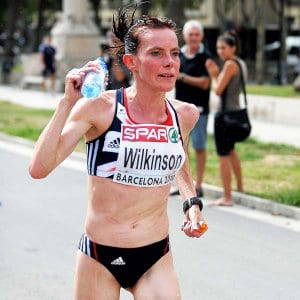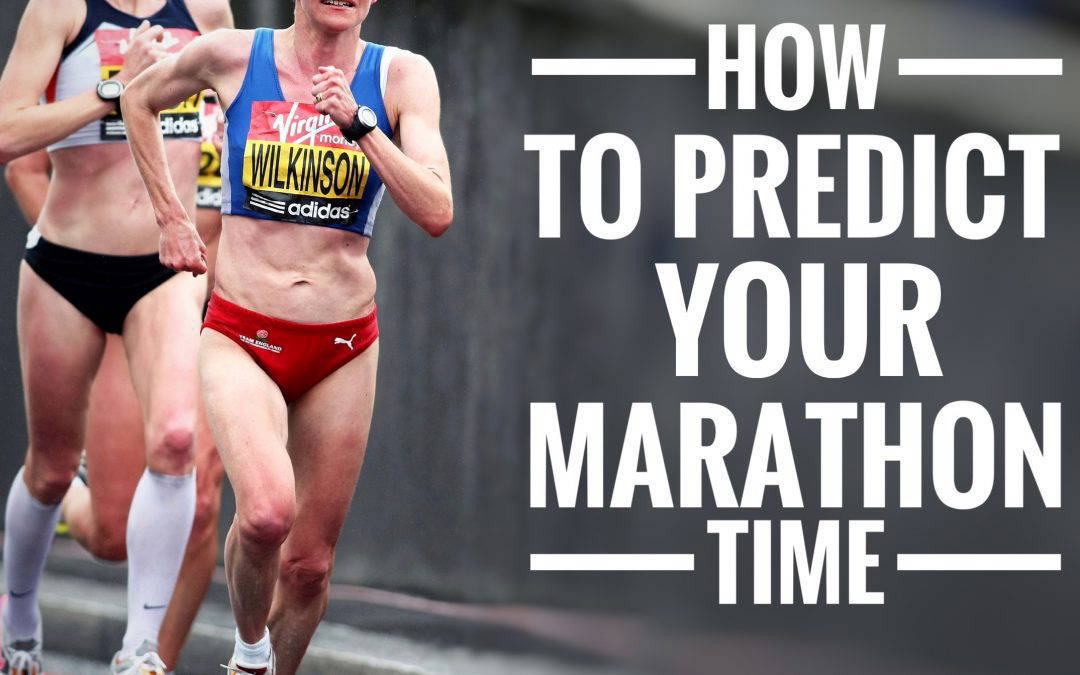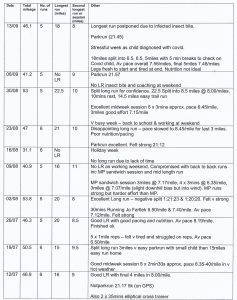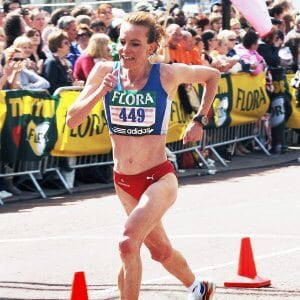 I am a former GB marathon runner who’s finished in the top 20 in the London Marathon Elite Women’s race. Now I am a full-time marathon coach. At this time of year my work revolves around predicting marathon times and devising race strategies. But how do you predict your marathon time?
I am a former GB marathon runner who’s finished in the top 20 in the London Marathon Elite Women’s race. Now I am a full-time marathon coach. At this time of year my work revolves around predicting marathon times and devising race strategies. But how do you predict your marathon time?
It’s based on years of experience as a runner and coach, expertise in coaching, knowledge of effective training principles, insight into how training translates into races in real life and a little bit of gut feeling.
So here’s an insight into how to predict your marathon time based on my own London Marathon training.
Look back to look forward
Based on timescale for training adaptation I start by looking back at the previous ten to twelve weeks of training In essence, the training you did two or three months ago is the foundation for your fitness today.
My first step is always to compile a table with the key information below. Just to note I always consider the training block PRIOR to the taper period which should usually be two or three weeks before your target race.
- Total mileage
- Number of runs per week
- Distance of long run
- Second longest run
- Other good training sessions that week
- Any other information that might be relevant e.g. holidays, illness, injury
So here is mine.
Let’s start by looking at the numbers.
The marathon is a predominantly an aerobic event. So you need a solid aerobic base to run well. This relies on a consistent volume of regular of steady running. Both across each week and the training period as a whole.
Look at the number in the first few columns. This is the first question to ask yourself.
Does my training have a consistent aerobic base?
A good way to assess consistency is to work out your average weekly mileage for the period. Add together each weekly total and divide by the number of weeks. Likewise do the same for the number of runs each week. Then review how close each week is to your average. This tells you how consistent your training was over the period.
My weekly average is 45.7miles and 5.5 runs per week. So despite some minor weekly variation you can see the consistent regular base is there across the whole training block. However, on greater reflection you can see there were some gaps in long runs and weekly volume towards the end of the block.
How many miles do I need to run in training to run the marathon?
This is probably one of the most common questions I get asked. There’s no easy answer. It depends upon your marathon goals. Your regular weekly volume helps develop your endurance. Endurance is the ability to maintain a consistent, set level of activity (your running pace) for a set extended duration (the marathon).
From my experience, to be confident you can finish, your minimum weekly total should be equivalent to the marathon distance. However, it’s likely you will lack some significant endurance to run much faster than your training pace in the race itself.
The bigger your regular weekly total mileage, the better your endurance is likely to be. (Leaving aside the thorny issue of junk mileage for now). This means you are more likely to run faster and finish stronger in the actual marathon itself.
Aerobic endurance is something that develops over years not just weeks and months. Training adaptations to the cardio-vascular system can be developed in a relatively short-term period. Other physiological adaptations within the muscles, such as increased capillarisation and changes to mitochondria, take up to 12 months and beyond. So at this point I’d also take a quick look back at your training history. Ask yourself these additional questions.
How long have I been training regularly?
What has been my regular consistent running volume over the previous three/six/twelve months?
The longer your history of regular running, the more endurance you will have. Back to my training again. I competed in the Suffolk Running Festival 24hour race at the beginning of July. This means my current training is based on the strong foundation from the 8-week training block prior to the 24 hour race. Working backwards in those weeks I clocked up 34, 50, 50, 50, 30, 44, 40 and 37 miles per week. All built on top of many years of running.
How long were my longest runs?
The final bit of number-crunching involves looking at your long runs. Don’t just look at how far you covered in your longest run. Assess how many long runs you did and how frequently over the whole training period. You are more likely to have better endurance if your long runs were regular and progressive across the whole training block.
But it’s not just about your long runs. There are many different approaches to how you structure training. As a coach I believe that you gain better aerobic endurance when your long run is supported by a second mid-length run. So also ask yourself this:
What was my second longest run each week?
You can see my longest runs build up from 16 miles to 22.5 miles across the ten weeks. Even though I didn’t run a long run every week, there are regular longer runs over the training block. The long runs are regularly supported each week by a second run between 8-11 miles. Which builds confidence in my endurance when it comes to race day.
Time to look at the detail
Now we need to get into the detail. The numbers give you an overview. But they only tell you part of the story. The real secret to a good prediction is to look at the nuances.
What pace did I run my long runs?
This is the first key question. Be warned it’s easy to make some common mistakes here. Before you go any further ask yourself these additional questions
Did I run a consistent pace throughout each run or did my pace slow down significantly each time?
How many times did I stop my watch on each long run and does that significantly change the total elapsed time?
Was I able to run negative splits or some specific marathon pace miles on my long runs?
 One common mistake inexperienced runners (and indeed coaches) make is assuming that long runs were run at the most effective pace and effort. In fact, many runners run their long runs too hard. This leads to the erroneous belief that, following popular opinion, your race pace will be between 45-90secs per mile FASTER than your long run. Honest self-assessment based on the additional questions above will help you make a much more accurate determination of how your long run pace might translate into race pace.
One common mistake inexperienced runners (and indeed coaches) make is assuming that long runs were run at the most effective pace and effort. In fact, many runners run their long runs too hard. This leads to the erroneous belief that, following popular opinion, your race pace will be between 45-90secs per mile FASTER than your long run. Honest self-assessment based on the additional questions above will help you make a much more accurate determination of how your long run pace might translate into race pace.
I hold my hands up here and confess my long runs don’t always set a good example! Several runs were definitely done at a conversational pace and comfortable effort. But several were harder than this. Especially towards the end. The most comfortable long runs had an average pace of 8:30/mile.
Several long runs had even or negative splits. But at the end of some of the longer runs my effort level rose significantly higher to maintain the same pace. I had some good strong runs at 8:00/mile and below. However, if I am honest, these were not easy runs and there was not much more to give.
Some other key questions include:
How did you feel at the end of your long run?
How did your legs feel the next day after your long run?
After most long runs my legs were very tired and stiff the next day suggesting that my muscular strength and endurance is not as good as it could be. One or two runs were split runs (partly due to the need to build confidence after a few “bad” runs and partly for practical reasons to enable me to fit them into my busy life).
In conclusion, when you look at the detail the long runs are not as good as they first seem. The key though is that I KNOW this so I am not lulled into a false sense of confidence about my potential pace.
So what does that mean for race pace? Based on this honest review of my long runs and my experience as a coach and athlete, I would suggest there’s less pace to gain from my long runs than it might seem at first sight. If my average long run pace is approximately 8:20-30/mile I estimate I have approximately 30-40secs per mile to gain when I translate that into race pace.
But there’s still some other final few elements of training to consider.
What other sessions did you run?
It’s worth looking at the other training sessions that you ran too. Whilst aerobic fitness is the foundation for marathons, these give you an insight into your overall fitness. These sessions can also help with confidence which is an essential part of performance on the day. Ideally you would like to see a range of pace in different sessions. However, be warned. Smashing out super-fast short intervals, or even a killer parkrun, is not the best overall indicator of marathon fitness! Look at how specific your sessions were compared to the marathon event. This doesn’t mean lots of marathon pace running. But it does mean a greater focus on threshold effort than sub 5k pace or even faster!
Looking back at several of my sessions over the last ten weeks gives me confidence that I have a good foundation of fitness across the energy systems. What’s more, confidence in my ability to run faster helps me to feel comfortable at marathon pace in the early stages of the race itself.
A few other things to consider
How do you perform in races compared to training?
Some of us can rise to the occasion whilst others find the nerves and pressure get to them more than most. “Race Jo” is my alter-ego who can always be relied upon to find something extra on the day. Years of experience of preparing for race, delivering performances and managing nerves means I have good confidence in my ability to run my best on the day.
But even if you don’t feel the same, it’s never too late to start working on some techniques to help you in races. Visualisation, anxiety management techniques to help with nerves and positive self-talk are only some of the ways that can help.
What are you like at pacing and nutrition?
Good pacing and nutrition are both equally essential to good marathon running. I describe them as the best way to gain “free extra time” in the race. Hopefully you will have practised both good pacing and your race nutrition on some, if not all, of your longer runs. Numerous studies have confirmed that the most effective pacing strategy for the marathon is to run even or negative splits. Those runners who set off too fast often end up running significantly below their best times at the end. Likewise effective nutrition ensures you can fulfil your potential from training on the day.
So there you have it.
And for me? My prediction is 3:27 or approximately 7:50-55/mile.




